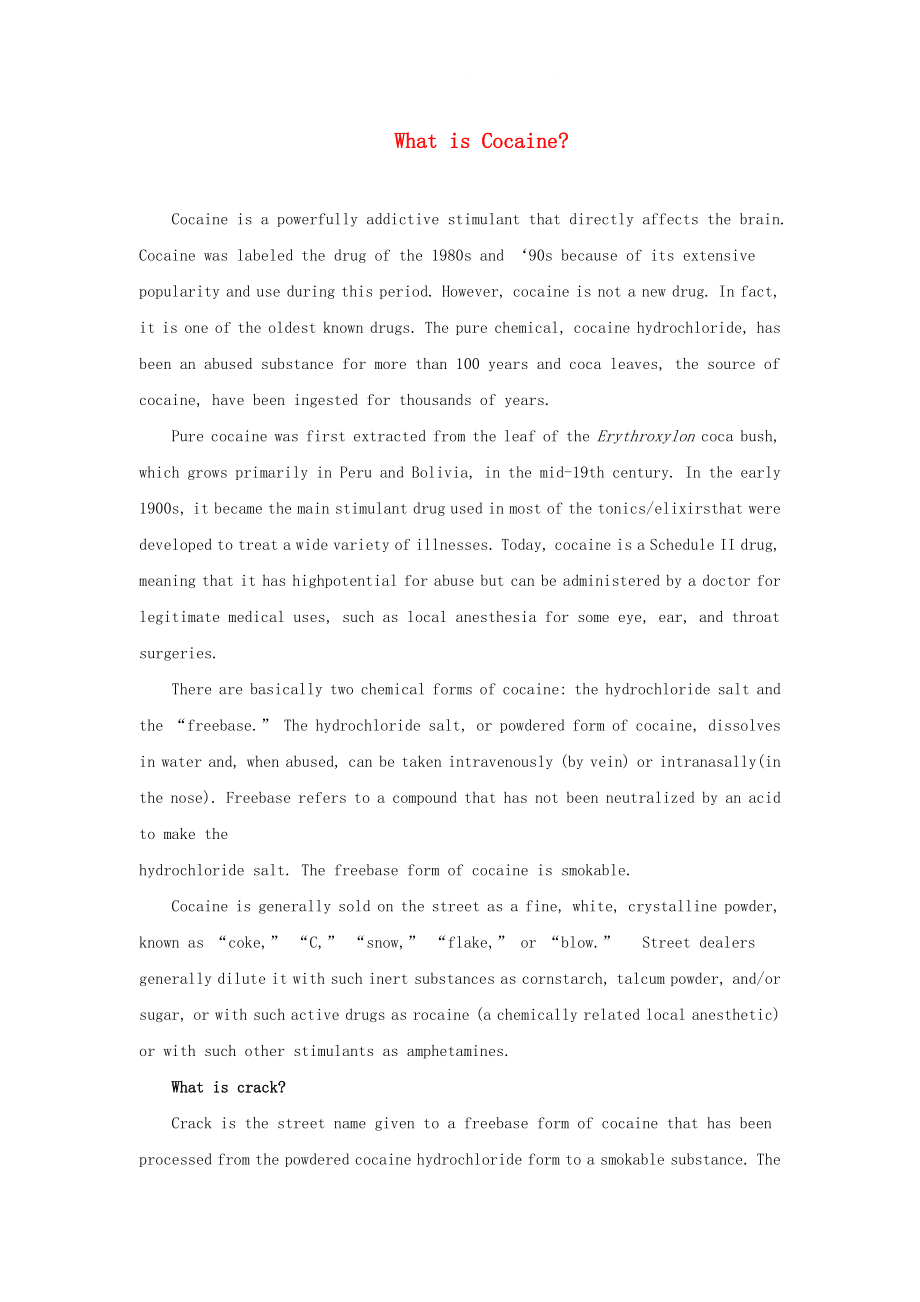《2021高中英語(yǔ) module2 What is Cocaine素材 外研版必修2》由會(huì)員分享��,可在線(xiàn)閱讀���,更多相關(guān)《2021高中英語(yǔ) module2 What is Cocaine素材 外研版必修2(3頁(yè)珍藏版)》請(qǐng)?jiān)谘b配圖網(wǎng)上搜索。
1��、本資料為共享資料 來(lái)自網(wǎng)絡(luò) 如有相似概不負(fù)責(zé)
What is Cocaine?
Cocaine is a powerfully addictive stimulant that directly affects the brain. Cocaine was labeled the drug of the 1980s and ‘90s because of its extensive popularity and use during this period. However, cocaine is not a new drug. In fact, it is one of the olde
2��、st known drugs. The pure chemical, cocaine hydrochloride, has been an abused substance for more than 100 years and coca leaves, the source of cocaine, have been ingested for thousands of years.
Pure cocaine was first extracted from the leaf of the Erythroxylon coca bush, which grows primarily in Pe
3、ru and Bolivia, in the mid-19th century. In the early 1900s, it became the main stimulant drug used in most of the tonics/elixirsthat were developed to treat a wide variety of illnesses. Today, cocaine is a Schedule II drug, meaning that it has highpotential for abuse but can be administered by a do
4��、ctor for legitimate medical uses, such as local anesthesia for some eye, ear, and throat surgeries.
There are basically two chemical forms of cocaine: the hydrochloride salt and the “freebase.” The hydrochloride salt, or powdered form of cocaine, dissolves in water and, when abused, can be taken in
5��、travenously (by vein) or intranasally(in the nose). Freebase refers to a compound that has not been neutralized by an acid to make the
hydrochloride salt. The freebase form of cocaine is smokable.
Cocaine is generally sold on the street as a fine, white, crystalline powder, known as “coke,” “C,” “
6��、snow,” “flake,” or “blow.”? Street dealers generally dilute it with such inert substances as cornstarch, talcum powder, and/or sugar, or with such active drugs as rocaine (a chemically related local anesthetic) or with such other stimulants as amphetamines.
What is crack?
Crack is the street name
7��、given to a freebase form of cocaine that has been processed from the powdered cocaine hydrochloride form to a smokable substance. The term “crack” refers to the crackling sound heard when the mixture is smoked. Crack cocaine is processed with ammonia or sodium bicarbonate (baking soda) and water, an
8���、d heated to remove the hydrochloride.
Because crack is smoked, the user experiences a high in less than 10 seconds. This rather immediate and euphoric effect is one of the reasons that crack became enormously popular in the mid 1980s. Another reason is that crack is inexpensive both to produce and
9���、to buy. Crack cocaine remains a serious problem in the United States. The National Survey on Drug Use and Health (NSDUH) estimated the number of current crack users to be about 567,000 in 2020.
What is the scope of cocaine use in the United States?
In 2020, an estimated 1.5 million Americans could
10、 be classified as dependent on or abusing cocaine in the past 12 months, according to the NSDUH. The same survey estimates that there are 2.0 million current (past-month) users.
Cocaine initiation steadily increased during the 1990s, reaching 1.2 million in 2001.
Adults 18 to 25 years old have a
11���、higher rate of current cocaine use than those in any other age group. Overall, men have a higher rate of current cocaine use than do women. Also, according to the 2020 NSDUH, estimated rates of current cocaine users were 2.0 percent for American Indians or Alaskan Natives, 1.6 percent for African-Am
12���、ericans, 0.8 percent for both Whites and Hispanics, 0.6 percent for Native Hawaiian or other Pacific Islanders, and 0.2 percent for Asians.
The 2020 Monitoring the Future Survey, which annually surveys teen attitudes and recent drug use, reports that crack cocaine use decreased among 10th-graders i
13���、n 30-day, annual, and lifetime use prevalence periods. This was the only statistically significant change affecting cocaine in any form. Past-year use of crack declined from 2.3 percent in 2020 to 1.6 percent in 2020. Last year, the rate increased from 1.8 percent to 2.3 percent, and this year’s decline brings it to approximately its 2001 level.
Data from the Drug Abuse Warning Network (DAWN) showed that cocaine-related emergency department visits increased 33 percent between 1995 and 2020, rising from 58 to 78 mentions per 100,000 population.
 2021高中英語(yǔ) module2 What is Cocaine素材 外研版必修2
2021高中英語(yǔ) module2 What is Cocaine素材 外研版必修2

